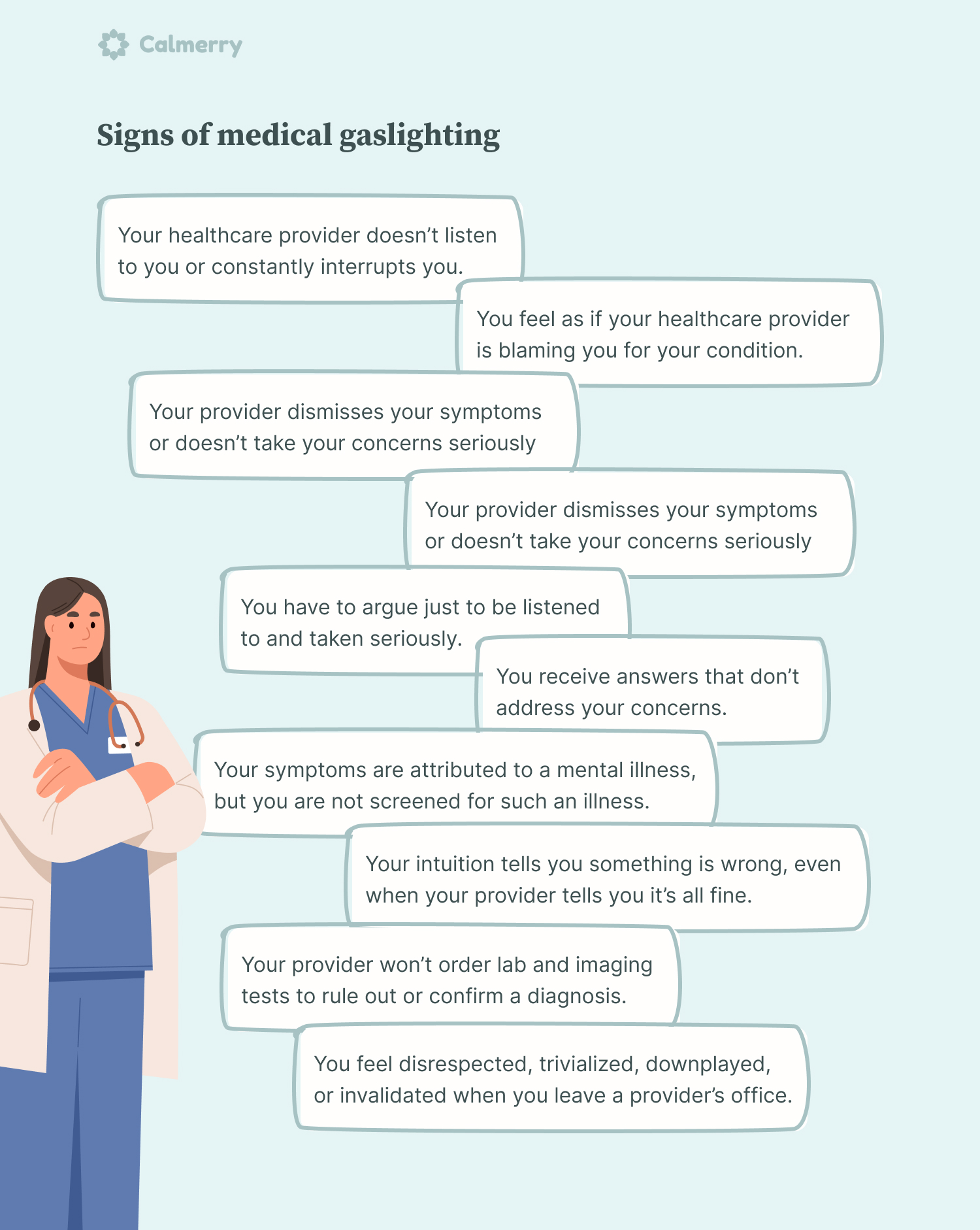Medical gaslighting is an insidious practice that affects countless patients, particularly those contending with elusive medical conditions like long COVID or chronic pains without clear diagnoses. This phenomenon occurs when healthcare providers dismiss a patient’s legitimate concerns, leading them to question their own health experiences. Often, this dismissal stems from a lack of time and empathy in healthcare settings, further complicating the patient-provider relationship. With doctor burnout on the rise, the overwhelming pressure on practitioners to process patients quickly can contribute to episodes of medical invalidation. Recognizing and addressing medical gaslighting is essential for validating patients’ experiences and fostering healthier, more compassionate healthcare interactions.
The issue commonly termed as medical gaslighting, which often involves the invalidation of patient experiences, highlights a troubling reality in modern healthcare. When patients feel their health concerns are trivialized or ignored, it can severely undermine trust in their healthcare providers. This trend can also be described as medical invalidation—when a provider’s actions inadvertently make a patient doubt their reality. Such occurrences can stem from larger systemic issues like doctor burnout and excessive caseload pressures, which hinder open communication and empathy in healthcare settings. As awareness of these issues grows, it becomes increasingly important to consider how to improve the patient-provider relationship and ensure healthcare validation.
Understanding Medical Gaslighting
Medical gaslighting refers to a situation where healthcare providers invalidate a patient’s experience, often leading them to feel frustrated, unheard, or misdiagnosed. This phenomenon often emerges when doctors struggle to find a clear cause for complex symptoms, like those associated with long COVID or irritable bowel syndrome. Instead of acknowledging the patient’s distress, some practitioners may suggest that the condition is psychological or ‘all in their head,’ dismissing their genuine suffering. This disconnect can exacerbate feelings of isolation and distress, making it vital for both patients and providers to understand that these situations arise from systemic pressures, rather than malicious intent.
In recent years, social media has served as a platform for patients to share their experiences, amplifying awareness about medical gaslighting. This increasing visibility has facilitated a broader conversation about their impact on the patient-provider relationship. By reframing the conversation from ‘gaslighting’ to ‘medical invalidation,’ it opens doors for understanding how healthcare providers can better empathize with their patients and foster a supportive dialogue. Practicing active listening, validating experiences, and collaboratively working towards solutions can help mitigate feelings of gaslighting and restore trust within medical interactions.
The Role of Healthcare Validation
Healthcare validation involves recognizing and affirming a patient’s experiences, emotions, and concerns within the medical environment. It plays a crucial role in building trust in the patient-provider relationship, enabling patients to feel more secure and open about their health struggles. When healthcare providers take the time to listen actively and validate a patient’s experiences, it fosters a deeper understanding of the patient’s condition and promotes empathy in healthcare. This validation is especially important in complex cases to ensure patients do not feel dismissed or discouraged when seeking medical help.
Incorporating healthcare validation into practice requires a shift in how physicians approach their patient interactions. Providers are often under immense pressure due to high caseloads, leading to a focus on productivity rather than empathy. However, prioritizing the emotional and psychological needs of patients can lead to more comprehensive care. Studies show that validated patients are more likely to adhere to treatment plans, leading to improved health outcomes. Thus, creating space for validation within medical consultations not only enhances the patient experience but also reduces the likelihood of medical invalidation occurring.
The Impact of Physicians’ Burnout on Patient Care
Physician burnout is a pervasive issue in the healthcare system, affecting over half of medical practitioners. The constant pressure to see more patients within limited time frames contributes to emotional exhaustion, which can adversely affect the patient-provider interaction. Burnt-out doctors may struggle with empathy and active listening, resulting in a higher likelihood of dismissing patient concerns. This situation creates a cycle of medical invalidation, where patients feel marginalized and providers become increasingly detached from their patients’ needs.
To tackle this issue, healthcare organizations must recognize the systemic factors leading to doctor burnout. By prioritizing physician well-being and fostering an environment of support, institutions can help reduce emotional exhaustion and improve the quality of patient interactions. This not only benefits the providers but also enhances patient satisfaction and trust. Addressing burnout is crucial as it paves the way for building a more compassionate and empathetic healthcare system, ultimately leading to better health outcomes.
Empathy in Healthcare: A Vital Component
Empathy in healthcare is essential for establishing strong patient-provider relationships. It enables providers to better understand their patients’ experiences and encourages open communication. When doctors demonstrate genuine concern and compassion, patients are more likely to share their symptoms and health concerns without fear of dismissal. Effective empathic communication allows healthcare providers to validate a patient’s feelings, making them feel heard and respected. This connection can significantly enhance the overall healthcare experience, translating to improved health outcomes.
Moreover, fostering empathy in healthcare is not solely the responsibility of individual providers but is an organizational imperative. Training programs focused on enhancing emotional intelligence and communication skills can help equip healthcare professionals with the tools necessary to foster empathetic interactions. Implementing regular staff wellness initiatives can also encourage resilience and connectedness among healthcare teams. By embedding empathy into the fabric of healthcare practice, we create a more compassionate environment for both patients and practitioners alike.
Building Collaborative Patient-Provider Relationships
A collaborative patient-provider relationship is key to effective healthcare delivery. By working together, both parties can participate in the decision-making process, leading to tailored treatment plans that respect the patient’s individual needs and experiences. This approach not only encourages shared responsibility but also reinforces patient autonomy, allowing individuals to feel more empowered regarding their health. Consequently, when patients feel included and heard in their care, it can lead to enhanced adherence to treatment regimens and improved health outcomes.
To strengthen these relationships, healthcare providers should engage in open dialogue and practice shared decision-making. This can be achieved by asking open-ended questions, showing genuine interest in the patient’s concerns, and avoiding medical jargon that may alienate patients. Trust can flourish in an environment where patients feel they are partners in their healthcare journey. This collaborative approach diminishes instances of medical invalidation and reflects a more holistic understanding of the patient’s needs.
Reframing Medical Invalidation
Reframing medical invalidation involves recognizing and addressing behaviors that lead to patients feeling dismissed or misunderstood. By understanding that not all instances of inadequate validation stem from malicious intent, practitioners can engage in constructive conversations regarding their interactions with patients. This new perspective encourages healthcare providers to reflect on their practices and seek ways to enhance their empathetic engagement rather than simply labeling their actions as ‘gaslighting.’ Understanding this nuance allows space for growth in the patient-provider relationship.
Healthcare systems can implement training programs that promote awareness about medical invalidation and its impacts. These educational initiatives should focus on developing empathy, effective communication skills, and techniques for engaging with patients in a meaningful way. By empowering providers with the knowledge and tools to avoid medical invalidation, we can create a healthcare environment that fosters trust, resilience, and healing. By actively addressing these issues, we can cultivate a healthier relationship between patients and healthcare professionals.
Challenges in Diagnosing Complex Conditions
Diagnosing complex conditions such as long COVID or chronic fatigue syndrome can pose significant challenges for healthcare providers. Often, these conditions do not exhibit clear indicators on standard tests, making it difficult for physicians to provide a definitive diagnosis. This ambiguity can lead to frustration for patients who feel their symptoms are not being taken seriously, and they may interpret doctors’ inability to identify a cause as dismissal or invalidation. Addressing these challenges requires both a commitment to thorough investigation and the establishment of a patient-centered approach.
To overcome these diagnostic hurdles, healthcare providers must approach complex conditions through a lens of collaboration and thorough exploration. Rather than focusing solely on objective symptoms, they should recognize the full spectrum of patient experiences and data. This holistic approach not only enhances diagnostic accuracy but also builds trust, encouraging patients to share more about their concerns. By investing time and effort to understand the intricacies of such conditions, healthcare providers can mitigate the risk of medical invalidation and contribute positively to patient outcomes.
The Importance of Continuous Medical Education
Continuous medical education plays a pivotal role in keeping healthcare providers informed about the latest advancements in medical science, treatment modalities, and patient-centered care approaches. By regularly engaging in educational opportunities, physicians can improve their diagnostic skills, learn about emerging health conditions, and refine their empathetic communication techniques. This commitment to education empowers clinicians to approach patient care with an informed, compassionate perspective, thus reducing the chances of medical gaslighting and invalidation.
Healthcare organizations can support continuous education by providing easier access to relevant courses, workshops, and seminars. Additionally, creating an environment that encourages knowledge sharing among peers can enhance collaborative learning. Investing in ongoing training enables providers to stay updated on the complexities of various conditions and promotes a culture of empathy and validation in patient care. Ultimately, nurturing a well-educated healthcare workforce is fundamental to achieving effective, compassionate medical practice.
Navigating the Future of Patient Care
Looking ahead, the future of patient care will hinge on recognizing and addressing issues such as medical gaslighting, physician burnout, and patient validation. As healthcare evolves, there is an increasing emphasis on integrating mental health and emotional well-being into overall patient health strategies. Embracing a more holistic model that considers psychological and emotional factors, in conjunction with physical health, will pave the way for improved patient experiences and outcomes.
Innovations in technology also present opportunities to enhance patient care. Telehealth services are growing and can facilitate more immediate and flexible interactions between patients and providers. By leveraging technology, healthcare systems can also create platforms for continuous dialogue and support for patients with chronic or complex conditions. Fostering these advancements while prioritizing empathy and understanding will ensure that healthcare professionals remain aligned with the needs and expectations of their patients.
Frequently Asked Questions
What is medical gaslighting and how can it affect patient-provider relationships?
Medical gaslighting refers to situations where a patient feels their concerns and symptoms are dismissed or invalidated by healthcare providers, often leading to a breakdown in the patient-provider relationship. This can result in feelings of frustration, isolation, and confusion for patients who may already be experiencing difficult health conditions.
How does medical invalidation relate to the concept of gaslighting in healthcare?
Medical invalidation, which often overlaps with medical gaslighting, occurs when healthcare providers inadvertently dismiss a patient’s symptoms without proper investigation. Unlike gaslighting, which involves intentional deception, medical invalidation arises from systemic pressures and can undermine empathy in healthcare.
What role does doctor burnout play in medical gaslighting?
Doctor burnout significantly contributes to medical gaslighting by impacting the quality of patient interactions. High caseloads and time constraints prevent physicians from engaging fully with patients, leading to missed opportunities for empathy and validation, which can result in unintentional dismissal of patient concerns.
How can healthcare validation improve the patient experience and combat medical gaslighting?
Healthcare validation involves recognizing and affirming a patient’s experiences and symptoms. By prioritizing empathy and open communication in the patient-provider relationship, healthcare providers can reduce instances of medical gaslighting and create a supportive environment that encourages patients to express their health concerns.
Why might physicians unintentionally engage in medical gaslighting behaviors?
Physicians may engage in medical gaslighting behaviors unintentionally due to systemic pressures such as high workloads and time limits during appointments. These conditions can lead to invalidation of patient experiences when providers focus more on efficiency than on understanding individual patient needs.
What strategies can healthcare providers use to prevent medical gaslighting?
To prevent medical gaslighting, healthcare providers can adopt strategies such as active listening, asking open-ended questions, allowing sufficient time for patient discussions, and fostering a collaborative approach to diagnosis and treatment. This encourages transparency and builds trust in the patient-provider relationship.
How can patients advocate for themselves to avoid medical gaslighting?
Patients can advocate for themselves by clearly communicating their symptoms, asking questions, and expressing their concerns during consultations. Bringing a written list of symptoms and questions to appointments can help ensure their voices are heard and respected in the healthcare process.
What are the long-term effects of medical gaslighting on patient health?
Long-term effects of medical gaslighting can include chronic stress, worsening health conditions, and decreased trust in the healthcare system. Patients may avoid seeking care in the future due to previous invalidating experiences, leading to detrimental health outcomes.
What is the significance of empathy in healthcare to combat medical gaslighting?
Empathy in healthcare is crucial in combating medical gaslighting as it fosters understanding and connection between patients and providers. When healthcare professionals actively demonstrate empathy, they validate patient experiences, reduce feelings of dismissal, and promote better overall health outcomes.
| Key Concept | Explanation |
|---|---|
| Medical Gaslighting | A phenomenon where patients feel dismissed or invalidated by healthcare providers, often leading to emotional distress. |
| Intent vs. Invalidation | Most cases of medical gaslighting lack malicious intent; instead, they should be referred to as ‘medical invalidation,’ where providers inadvertently dismiss patient experiences. |
| Impact of Healthcare Pressures | Pressures on physicians, such as caseload and documentation requirements, can contribute to feelings of invalidation during patient interactions. |
| Patient Experience | Patients with complex or hard-to-diagnose conditions often feel unheard, leading to frustration and a lack of trust in medical professionals. |
| Compassionate Care | Recognizing the lack of intent in many cases of medical gaslighting allows for a more compassionate approach to improving patient-provider relationships. |
Summary
Medical gaslighting is a significant issue within healthcare that can leave patients feeling invalidated and misunderstood. This phenomenon often arises from the pressures faced by healthcare providers, including high caseloads and systematic documentation demands. Understanding the distinction between intentional deception and unintentional invalidation is crucial for both improving patient experiences and fostering compassionate care. By reframing medical gaslighting as medical invalidation, we can better address the underlying issues and create more effective strategies to enhance communication and trust between patients and healthcare professionals.


